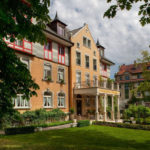 Recently, various studies have highlighted the importance of soft skills, such as creativity and collaboration, to success in the future of work, and this has prompted a range of new educational innovations attempt to shake up both the skills we learn and the way we learn them.
Recently, various studies have highlighted the importance of soft skills, such as creativity and collaboration, to success in the future of work, and this has prompted a range of new educational innovations attempt to shake up both the skills we learn and the way we learn them.
Joining this list is the Institut auf dem Rosenberg, a school in St. Gallen, Switzerland, that is launching a Talent & Enrichment Programme to try and provide students with the skills and attitude required to thrive in the future of work. Whereas many of the more innovative approaches have been applied in graduate education, the Institut is interesting because it’s aiming to do so for school children.
The boarding school, which has been operating for over 130 years, provides students with over 40 courses over and above the core academic curriculum. For instance, pupils have the opportunity to debate in a Model United Nations, competing alongside students from some of the best universities in Europe, or they have the opportunity to take numerous trips around Europe, with guest speakers regularly visiting the school.
“Schools kill creativity instead of enabling it. In a world in which artificial intelligence has an increasingly prominent role, the last human bastion are our ingenious minds and our unique ability to collaborate. Yet, schools do not adapt quickly enough, with teaching styles and content remaining almost unchanged for the past 120 years. We challenge this stereotype and refuse to run an educational establishment like a factory line. Our unique Talent & Enrichment Programme offers a completely new perspective, preparing the first truly enlightened generation for leadership in an exciting new world,” headmaster Bernhard Gademann says.
Co-curricular
The school also aims to bring activities that would ordinarily be regarded as extra-curricular and make them an integral part of the curriculum. The idea is that doing so helps to provide a broad and balanced education that better prepares students for life.
The school has 230 pupils of 47 different nationalities, with multiple languages spoken at the school. This is perhaps feasible as they have a staff to student ratio of just 3:1, with an average class size of just eight students. Each student also receives an individual development plan to guide them through their school life and out into the world.
“Our teams are true artisans of education who apply their experience, skills and attention to detail, in order to enable each pupil in our care to reach their full potential. We are not a boarding school in a traditional sense but a unique and holistic learning environment that is well beyond what other schools offer,” Gademann says.
The school believe that exposing students to a wide variety of life learning experiences outside of the classroom gives them the perfect platform to develop the kind of life skills, including creativity and grit, that will be required for them to thrive. The school hope that the activities will also help to inspire a love of learning and a thirst for knowledge.
“The disconnect between skills taught in traditional schools and the requirements to succeed in the professional world has never been this extensive. With change taking an exponential trajectory, this gap will only grow bigger. Rosenberg Talent & Enrichment bridges this rift by merging the academic world with the learning requirements of the 21st Century,” Gademann concludes.
Suffice to say, the school is private and so has a high degree of exclusivity to it, with the budgetary heft they can wield making it hard to draw direct lessons that can be applied to state schools that are forced to operate in a fundamentally different landscape. It is an interesting approach however and might provide some ideas that can be applied in a range of settings.